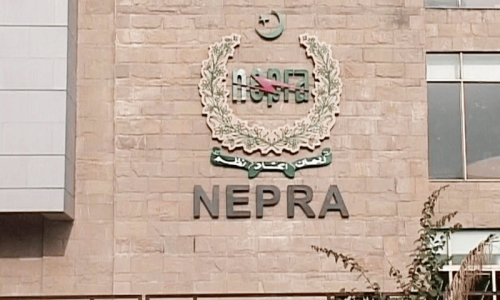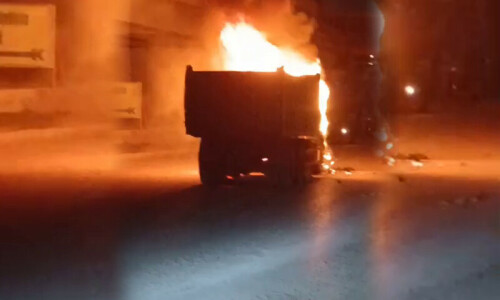The Supreme Court on Friday criticised the country's premier intelligence agency for failing to provide the financial details of leaders of the Faizabad sit-in, rejecting a report submitted by the agency in this regard.
A two-judge bench headed by Justice Mushir Alam had resumed hearing a suo motu case regarding the 20-day sit-in held at the Faizabad interchange in Islamabad/Rawalpindi by the Tehreek-i-Labbaik Pakistan's (TLP) in November 2017. Justice Qazi Faez Isa was the other member of the bench.
"Does the ISI [Inter-Services Intelligence] function under the law?" Justice Isa asked during the hearing, observing that the agency had said in a report it was not its job to obtain certain details of the Faizabad sit-in leaders' finances.
Examine: Another surrender
He said the protest sit-in had caused losses of billions and that the court wanted to know whether the persons "who can bring thousands of people" to the sit-in pay taxes.
"Can the ISI not even find out about the bank account of a person?" the judge wondered. He said the agency had said in response to the court's query that it could not furnish income tax details of the protest leaders and that it could be provided by the Federal Board of Revenue.
Justice Isa said if these things did not fall in the purview of the agency "then when [in the future] ISI interferes in other matters, we will ask: 'is this ISI's job?'."
The bench then wondered if it should summon the director general of the ISI or the defence secretary for an explanation.
Brigadier Falak Naz, the director of Ministry of Defence's law branch, said the agency could be asked to obtain the requisite details if the court so orders. "ISI looks after the national security [of the country]," he added.
"Is the sit-in not a matter of national security?" Justice Isa retorted, observing that the ISI was subservient to the country's law and Constitution.
The bench subsequently rejected the third report on the sit-in submitted by the ISI, and two other reports by the Election Commission of Pakistan (ECP) and the Pakistan Electronic Media Regularity Authority (Pemra).
The intelligence agency, ECP and Pemra were directed to submit new reports as the hearing was adjourned until next Thursday.
The court also directed the attorney general and information secretary to appear at the next hearing.
In November 2017, TLP workers demanding the resignation of then law minister Zahid Hamid had staged a weeks-long sit-in at the Faizabad interchange that had virtually paralysed the federal capital and led to several people losing their lives.
On November 21 of the same month, the apex court had taken notice of the sit-in and directed the defence and interior secretaries to submit a detailed report on the matter.
Days later, the then PML-N government had launched against the protesters an operation which, when failed, had forced the authorities to cave and Hamid to resign.
'Does anyone besides Pemra issue directions to media?'
The SC bench earlier grilled the Pemra chairman regarding a blackout of TV news channels that had taken place during the sit-in last year.
"Complaints had been received of [TV] channels being taken off-air during the Faizabad sit-in... what action did Pemra take against the cable operators [who took the channels off-air]?" Justice Isa asked Pemra chairman Muhammad Saleem Baig.
"Cable operators were fined Rs50,000," Baig replied.
But Justice Isa said the fine was not mentioned anywhere in the report submitted by Pemra. "Is there any proof that you imposed the fine?" he asked the chairman.
The explanations given by the chairman failed to convince the judge, who told Baig: "You are misusing your office."
The deputy attorney general, too, observed that were contradictions in the statements of the Pemra chairman, leading Justice Isa to remark, "You people do not care about Pakistan [because] you did not create it."
Justice Isa said measures such as raising walls of schools and suspending mobile signals during sit-ins were "not a solution" to security issues. "Is this the level of our security?" he wondered.
The bench also asked the Pemra chairman whether anyone besides the authority also issues directions to the country's electronic media.
"Is there a clandestine force that issues directions to the media?" Justice Isa said, to which the Pemra chairman replied in the negative.
"You are the chairman and you don't even know that secret instructions are being received," the judge told Baig. He said only a person of a high rank could have a channel taken off-air and "you can't take action against [such a person]".
Justice Isa then recalled that a sit-in had also been staged in Islamabad's Red Zone. The sit-in, staged by the Pakistan Tehreek-i-Insaf and Pakistan Awami Tehreek in 2014, had demanded that a judicial commission be formed to probe rigging in the 2013 elections.
"The judgement that the commission gave is before everyone," he said. The commission had concluded in its report that the 2013 polls were in large part "organised and conducted fairly and in accordance with the law".
"Have the people who staged the sit-in apologised after the judicial commission's report [was released]?" Justice Isa asked.
'Will Pakistan be run through law or street power?'
At the outset of the hearing, the SC bench expressed severe displeasure at the absence of the attorney general at the court.
"The attorney general was instructed to appear in [SC's] Lahore registry by the chief justice," Deputy Attorney General Sohail Mehmood revealed, asking the court to adjourn the hearing.
"The instructions are not issued by the chief justice but the court," Justice Isa responded. "We are also a court [here] and this hearing date was set on the attorney general's wish."
"This is not a joke," the judge remarked, wondering what other case could be more important than the one which relates to "Pakistan being shut down".
"The attorney general is answerable because he is paid from the public's taxes," he added.
Justice Isa said the government should inform the court if it does not want the case to continue. "Tell [us] whether Pakistan should be run through the law or street power," he added.













































